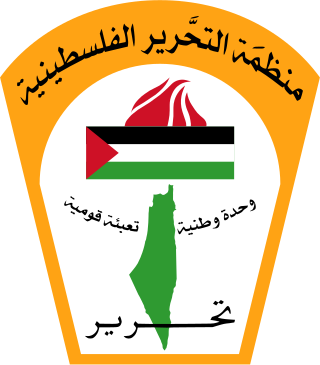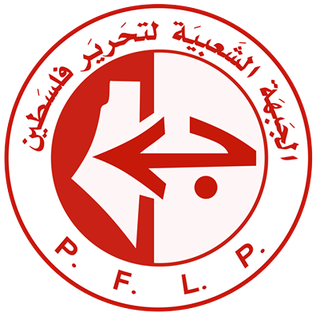
Fatah, formally the Palestinian National Liberation Movement, is a Palestinian nationalist and social democratic political party. It is the largest faction of the confederated multi-party Palestine Liberation Organization (PLO) and the second-largest party in the Palestinian Legislative Council (PLC). Mahmoud Abbas, the President of the Palestinian Authority, is the chairman of Fatah.

The Palestine Liberation Organization is a Palestinian nationalist coalition that is internationally recognized as the official representative of the Palestinian people; i.e. the globally dispersed population, not just those in the Palestinian territories who are represented by the Palestinian Authority. Founded in 1964, it initially sought to establish an Arab state over the entire territory of the former Mandatory Palestine, advocating the elimination of the State of Israel. However, in 1993, the PLO recognized Israeli sovereignty with the Oslo I Accord, and now only seeks Arab statehood in the Palestinian territories that have been militarily occupied by Israel since the 1967 Arab–Israeli War.
Palestinians hold a diverse range of views on the peace process with Israel, though the goal that unites them is the end of the Israeli occupation of the West Bank. Some Palestinians accept a two-state solution, with the West Bank and the Gaza Strip forming a distinct Palestinian state, whereas other Palestinians insist on a one-state solution with equal rights for all citizens whether they are Muslims, Christians or Jews. In this scenario, Palestinian refugees may be allowed to resettle the land they were forced to flee in the 1948 Palestinian expulsion and flight. However, widespread anti-Semitic sentiments in Palestinian society and Palestinian militancy have hindered the peace process.

Yasser Arafat, also popularly known by his kunya Abu Ammar, was a Palestinian political leader. He was chairman of the Palestine Liberation Organization (PLO) from 1969 to 2004 and president of the Palestinian National Authority (PNA) from 1994 to 2004. Ideologically an Arab nationalist and a socialist, Arafat was a founding member of the Fatah political party, which he led from 1959 until 2004.

The First Intifada, also known as the First Palestinian Intifada or the Stone Intifada, was a sustained series of protests, acts of civil disobedience and riots carried out by Palestinians in the Israeli-occupied Palestinian territories and Israel. It was motivated by collective Palestinian frustration over Israel's military occupation of the West Bank and the Gaza Strip, as it approached a twenty-year mark, having begun in the wake of the 1967 Arab–Israeli War. The uprising lasted from December 1987 until the Madrid Conference of 1991, though some date its conclusion to 1993, with the signing of the Oslo Accords.

Palestine, officially known as the State of Palestine, is a country in southern Levant region of the West Asia. The country shares is bordered with Israel to the east, north and west, Jordan to the east, Egypt to the southwest and the Mediterranean Sea to the west. It encompasses the Israeli-occupied West Bank and Gaza Strip, collectively known as the Palestinian territories. Palestine has a total land area of 6,020 square kilometres (2,320 sq mi) while its population exceeds five million people.The Palestinian people are mostly Arabs, while Kurds, Turks, Armenians and Assyrians are also found. Majority of Palestinian people are Muslims, with minority includes Christians, Samaritans and Druze. Jerusalem is the proclaimed capital, Ramallah is the administrative center and Gaza City is the largest city, as of 2023.

George Habash was a Palestinian politician and physician who founded the Marxist–Leninist Popular Front for the Liberation of Palestine (PFLP).

Khalil Ibrahim al-Wazir was a Palestinian leader and co-founder of the nationalist party Fatah. As a top aide of Palestine Liberation Organization (PLO) Chairman Yasser Arafat, al-Wazir had considerable influence in Fatah's military activities, eventually becoming the commander of Fatah's armed wing al-Assifa.

Beit Sahour or Beit Sahur is a Palestinian town east of Bethlehem, in the Bethlehem Governorate of the State of Palestine. The city is under the administration of the Palestinian National Authority. The population was of 13,281 in 2017, consisting of approximately 80% Christians and 20% Muslims.

Palestinian political violence refers to actions carried out by Palestinians with the intent to achieve political objectives that can involve the use of force, some of which are considered acts of terror, and often carried out in the context of the Israeli–Palestinian conflict. Common objectives of political violence by Palestinian groups include self-determination in and sovereignty over all of Palestine, or the recognition of a Palestinian state inside the 1967 borders. This includes the objective of ending the Israeli occupation. More limited goals include the release of Palestinian prisoners held by Israel and recognition of the Palestinian right of return.
The Arab–Israeli conflict began in the 20th century, evolving from earlier Intercommunal violence in Mandatory Palestine. The conflict became a major international issue with the birth of Israel in 1948. The Arab–Israeli conflict has resulted in at least five major wars and a number of minor conflicts. It has also been the source of two major Palestinian uprisings (intifadas).

Palestinian fedayeen are militants or guerrillas of a nationalist orientation from among the Palestinian people. Most Palestinians consider the fedayeen to be freedom fighters, while most Israelis consider them to be terrorists.
The National Liberation League in Palestine was a political party in Palestine, founded in early 1944 by Arab members of the Palestine Communist Party, Bulus Farah and his followers, and other trade unionists and left wing intellectuals.

Egypt–Palestine relations are the bilateral relations between the Arab Republic of Egypt and the State of Palestine. Egyptian President Gamal Abdel Nasser was a strong supporter of the Palestinian cause and he favored self-determination for the Palestinians. Although the Egyptian government has maintained a good relationship with Israel since the Camp David Accords, most Egyptians strongly resent Israel, and disapprove of the close relationship between the Israeli and Egyptian governments.

The Palestinian Declaration of Independence formally established the State of Palestine, and was written by Palestinian poet Mahmoud Darwish and proclaimed by Yasser Arafat on 15 November 1988 in Algiers, Algeria. It had previously been adopted by the Palestinian National Council (PNC), the legislative body of the Palestine Liberation Organization (PLO), by a vote of 253 in favour, 46 against, and 10 abstaining. It was read at the closing session of the 19th PNC to a standing ovation. Upon completing the reading of the declaration, Arafat, as Chairman of the PLO, assumed the title of President of Palestine. In April 1989, the PLO Central Council elected Arafat as the first President of the State of Palestine.

The Popular Front for the Liberation of Palestine is a secular Palestinian Marxist–Leninist and revolutionary socialist organization founded in 1967 by George Habash. It has consistently been the second-largest of the groups forming the Palestine Liberation Organization, the largest being Fatah.

The Democratic Front for the Liberation of Palestine is a secular Palestinian Marxist–Leninist and Maoist organization. It is also frequently referred to as the Democratic Front, or al-Jabha al-Dīmūqrāṭiyya. It is a member organization of the Palestine Liberation Organization, the Alliance of Palestinian Forces and the Democratic Alliance List.

Palestinian nationalism is the national movement of the Palestinian people that espouses self-determination and sovereignty over the region of Palestine. Originally formed in the early 20th century in opposition to Zionism, Palestinian nationalism later internationalized and attached itself to other ideologies; it has thus rejected the occupation of the Palestinian territories by the government of Israel since the 1967 Six-Day War. Palestinian nationalists often draw upon broader political traditions in their ideology, such as Arab socialism and ethnic nationalism in the context of Muslim religious nationalism. Related beliefs have shaped the government of Palestine and continue to do so.
Arabi Musa Awwad, kunya Abu Fahd, was a Palestinian communist politician. He was a member of the Central Committee of the Palestinian National Liberation League and later the Jordanian Communist Party. Awwad was designated as secretary of the West Bank section of the Jordanian Communist Party after the Six-Day War in 1967 and emerged as a key leader of the Palestinian National Front. He spent over a decade in Jordanian and Israeli prisons and detention centers and was deported to Jordan in 1973. Awwad was elected to the Palestinian National Council and included in the Palestinian Central Council. In 1982, he founded the Revolutionary Palestinian Communist Party and became its general secretary. Awwad died in Amman, Jordan, in 2015.